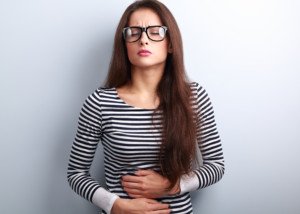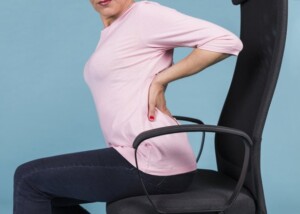
Mid-cycle joint aches or pain can affect some women.
Mid-cycle joint pain or aches are when a woman experiences a discomfort in her joints that feels just like the joint aching she gets in the days leading up to her period (PMS discomfort).
However, these joint aches occur about mid-cycle, out of the PMS range.
If a woman experiences mid-cycle discomfort in her joints, she can assume it’s related to the increased production of hormones called prostaglandins.
These are the same hormones that cause joint pain during PMS and even during her period.
“Prostaglandin is a chemical released in the body designed to cause a particular response,” says Randy Fink, MD, Director of the Center of Excellence for Obstetrics & Gynecology in Miami, FL.
“Prostaglandin is released in response to trauma, for instance, and it leads to activation of the immune system and inflammation.
“It is a cause of pain, as the body releases it to try to protect itself in some way – even though the result may be unpleasant and unhelpful.
“It causes headaches. It causes fever. It causes smooth muscle contractions, such as cramps.”
The joints in the neck, wrists, lower back and ankles can be affected.
The aching is not the same kind of discomfort felt if you’ve over-exercised or have arthritis.
“When the ovary releases its egg at mid-cycle (ovulation), the body may perceive this as a type of trauma,” says Dr. Fink.
“Many women feel cramps at the time of ovulation, and some have severe pain (known as ‘mittleschmirtz,’ or painful ovulation).
“These are caused by prostaglandin. In fact, sometimes a small amount of fluid is released into the abdominal cavity at the time of ovulation that may indeed cause a great deal of inflammation.”
So if a woman gets joint pain or aches at around mid-cycle (and the discomfort may persist for several days), this suggests that there’s either larger amounts of prostaglandins being secreted when she ovulates, or, her joints are sensitive to changes in her body’s metabolic processes.
However, despite the annoying nature of mid-cycle joint aches, this problem, when caused by the monthly cycle, does not indicate a medical problem.
Solutions for Mid-Cycle Joint Aching or Pain
Dr. Fink recommends taking a medication that inhibits prostaglandin production: namely, ibuprofen (Motrin, Advil), or Tylenol.
For best results, take the drug before the onset of discomfort.
“If your pain level is 10 out of 10 and you take a pain med, the best you will do is to bring it down to a 7 or 8.
Prostaglandin levels are already high, and they are hard to bring down.
“However, if you can stop the process before it gets out of control, you will be much more effective in managing this discomfort.
“If the pain level is a 2 or 3 because prostaglandin levels are rising and you take the medication, you can prevent the prostaglandin levels from maxing out and thus prevent the discomfort from escalating.”
Prostaglandins cause mid-cycle pain as well as ovulation discomfort and the classic menstrual cramps.
Dr. Fink emphasizes, “Take your medicine from the first moment you know the time is starting. Don’t be a hero and try to wait until it is bad!
“Preventing pain is much more effective than trying to make it go away.”
Creating an environment where the very best of medicine and gentle gynecology are practiced and where patients come first has always been Dr. Fink’s goal.
 Lorra Garrick has been covering medical, fitness and cybersecurity topics for many years, having written thousands of articles for print magazines and websites, including as a ghostwriter. She’s also a former ACE-certified personal trainer.
Lorra Garrick has been covering medical, fitness and cybersecurity topics for many years, having written thousands of articles for print magazines and websites, including as a ghostwriter. She’s also a former ACE-certified personal trainer.
.
Top image: ©Lorra Garrick
Why Are Acid Reflux and Gas Worse Right Before Menstruation?



























